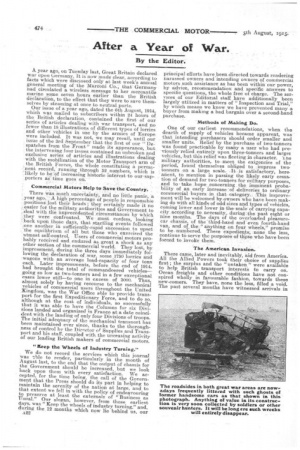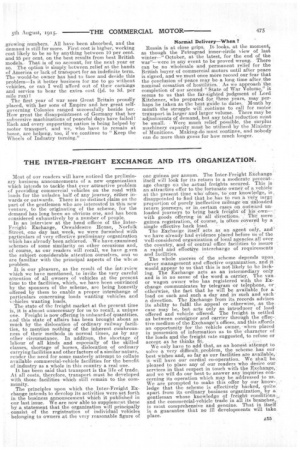After a Year of War.
Page 4

Page 5

If you've noticed an error in this article please click here to report it so we can fix it.
By the Editor.
A year ago, on Tuesday last, Great Britain declared war upon biermany. It is now made clear, according to facts which were disclosed only at last week's annual general meeting of the Marconi Co.; that Germany had circulated a wireless message to her mercantile marine some seven hours earlier than the British deCIarafron, to the effect that they were to save themselves by steaming at once to neutral ports. Our issue of a year ago, dated the 6th August, 1914, which was mailed to subscribers within 24 hours of the British declaration, contained the first of our series of articles dealing with war transport, and no fewer than 18 illustrations of different types of lorries and other vehicles in use by the armies of Europe were included. It was not, we may recall, until our issue of the 3rd September that the first of our " De' spatches from the Front" made its appearance, but : the intervening four issues contained an unbroken and exclusive series of articles and illustrations dealing with the mobilization of the Motor Transport arm of the British Forces, the whole constituting a perma-Dent record, running through 52 numbers, which is :likely to be of increasing historic interest to our ..porters as time goes on.
Commercial Motors Help to Save the Country.
There was much.uneertainty, and no little panic, a ; year ago. A high percentage of people in responsible positions lost their heads they certainly made it no easier for the military authorities and Government to :deal with the Unprecedented circumstances by Which they were confronted. We must confess, looking -back upon those days, that startling events followed one another in sufficiently-rapid succession to upset the equilibrium of all but those who exercised the utmost self-control. Users of commercial motors probably received and endured as great a shock as any other section of the commercial world. They lost, by impressment, during the three days immediately following the declaration of war, some 1750 lorries and wagons with an average load-capacity of four tons each. Later impressments, before the end of 1914, had brought the total of commandeered vehicles— going so low as two-tonners and in a few exceptional cases lower still—to one in excess. of 3000. Thus, almost solely by having recourse to the mechanical vehicles of commercial users throughout the United Kingdom, was the War Office able to provide transport for the first Expeditionary Force, and to do so, although at the cost of individuals, so successfully that it was able to have the Columns for six Divisions landed and organized in France at a date coincident with the landing of only four Divisions of troops. The initial adequacy of the mechanical transport has been maintained ever since, thanks to the thoroughness of control by the Director of Supplies and Transport and his staff, coupled with the unceasing activity of our leading British makers of commercial motors.
"Keep the Wheels of Industry Turning."
We do not record the services which this journal was able to render, particularly in the month of August last, to the end that the output of chassis for the Government should be increased, but we look back upon them with every satisfaction. We accepted, for the time being, the call of the Government that the Press should do its part in helping to maintain the serenity of the nation at large, and to that extent we fell in with the policy of endeavouring to preserve at least the externals of "Business as 'Usual." Our slogan, however, from those earliest days, was "Keep the wheels of industry turning," and, during the 12 months which now lie behind us, our
A22
principal efforts have been directed towards rendering harassed owners and intending owners of commercial motors such assistance as has been within' our power, by advice, recommendation and specific answers to specific questions, the whole free of charge. The services of our Editorial staff have additionally been largely utiiized in matters of "Inspection and Trial," by which means we know we have prevented many a buyer from making a bad bargain over a second-hand purchase.
Methods of Making Do.
One of our earliest recommendations, when the dearth of supply of vehicles became apparent, was that intending purchasers should order smaller and smaller units. Relief by the purchase of two-tonners was foundpracticable by many a user who had previouslyrelied entirely upon three-tonners and larger vehicles, -but this relief was fleeting in character. 'me military authorities, to--meet the exigencies of the . period, found themselves obliged to _Impress two . tonners on a large scale.It is' satisfactory, hereanent, to mention in passing the lik.ely_ early cessation of -demand for two-to-nners-for Military purposes, and to take . hope: .concerning . the imminent probability of an early increase of deliveries to ordinary commercial buyers -in_ that categery... This improvement will be welcomed by-owners who have been making do with all.kindsof 'odd siies aiaditypes of vehicles, coming lower and lower-in-the--scale-of carrying capacity. according. to neeessity; during :the past eight or nine months. The days of the overloaded pleasurecar chassis, of the third-hand and'-even fourth-hand van, and of the:." anything on four wheels," promise to be numbered. These expedients; .none the less, continue to 'serve the purpeses-of thnse who have been fore.ed to:invoke them.
The American Invasion.
There came, later and inevitably, aid from America. All the Allied Powers took their choice of supplies first ; the surplus and the "untaken " were available to help British transport interests to carry on. Ocean freights and other conditions have not conspired wholly in favourable fashion, towards these new-comers. They have, none the less, filled a void. The past several months have witnessed arrivals in growing numbers. • All have been absorbed, anil the demand is still for more. First cost is higher, working cost likely to be so by anything between 10 per cent. and 25 per cent, on the best results from best British models.. That is of no aecount, for the next year or so. The option is simply between,relief at the hands of America or lack of transport for an indefinite term. The would-be owner has had to face and decide this problem—Is it better business for me to go without vehicles, or can I well 'afford out of their earnings and service to bear the extra cost (id. to 3d. per mile run)7 •
The first. year of war. sees Great Britain proudly placed, with. her sons of Empire and her great selfgoverning Colonies ranged successfully beside her. How great the disappointment of Germany that her subversive machinations of peaceful days have failed Each and every supporting nation is being helped by motor transporte and we, who have to remain at home, are helping, too, if we continue to "Keep the Wheels of Industry turning."
Normal Delivery—When ?
Russia is at close grips. It looks, at the moment, as though the Petrograd inner-circle view of last winter—" October, at -the latest, for the end of the war"--were in any event to be proved wrong. There can be no ,wholesale and permanent relief for the British buyer of commercial motors until after peace is signed, and we must once more record our fear that the conclusion of peace may be a long time after the nominal cessation of hostilities. As we approach the completion of our second" State of War Volume," it seems to us that the far-sighted judgment of Lord Kitchener, who prepared for three years, may perhaps be taken as the best guide to dates. Month by month the struggle will continue to call for motor transport in larger and larger volume. There may be ' adjiistinents of demandebut anyetotal reduction must. be small. . Were much relief possible, the surplus machinery capacity must be utilized by the Ministry. of Munitions. Making-do must continue, and nobody can do more than guess for how much longer.




















